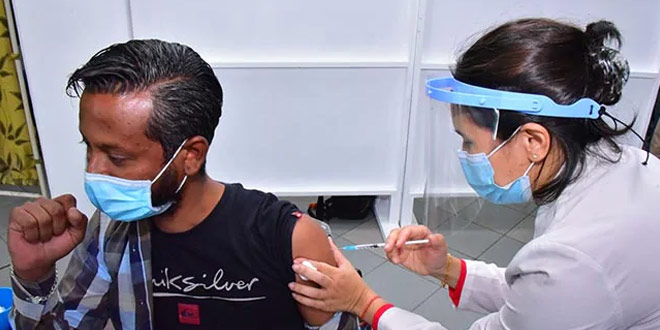Highlights
- Convincing people about for getting vaccinated is a challenge
- India aims to vaccinate all eligible, willing Indians by end of 2021: PM
- The country is battling a ferocious second wave of COVID-19
Lidderwat: As India rushes to vaccinate its people against the coronavirus, medical workers often have to trek to perilous heights and across treacherous terrain to reach those in remote areas. In the northern region of Lidderwat, more than 100 km (60 miles) from the capital of India-administered Kashmir, medical teams have had to trek more than six hours on foot and ponies to reach nomadic and shepherd tribes in the mountains.
Also Read: Centres Asks States To Prepare Plans For Expediting Second-Dose Coverage Among Healthcare Workers
On a recent morning, Reuters tagged along with a team of over a dozen health workers carrying medical kits and equipment including oxygen cylinders atop ponies and on foot to Lidderwat.
In a meadow surrounded by mountain peaks, the workers set up the vaccination site, wearing blue protective suits as people gathered.
Part of the challenge was also to convince people.
“They (nomadic tribes) are not entirely educated or aware about vaccination,” the locally-based medical official Nasir Khan told Reuters.
“We had to talk to them, motivate them to convince and mobilize them,” he said. “It’s a faith building process…there was hesitancy in the beginning.”
Despite being among the world’s major producers of coronavirus vaccines, India faces a mammoth task in innoculating its 1.3 billion people, partly due to the logistical challenges of reaching remote areas and skepticism and lack of knowledge about the process.
Also Read: Reduction In COVID-19 Vaccine Wastage Will Ensure Enhanced Vaccination: Government
Prime Minister Narendra Modi’s government has said it aims to vaccinate all eligible and willing Indians by the end of this year, but so far, only 240 million of the country’s 950 million adults have had at least one shot, according to federal health data.
The country is battling a ferocious second wave of the coronavirus that has battered its health system, and scientists have warned vaccinations are critical to protect against a third wave of the virus expected later this year.
India has recorded some 29.3 million COVID-19 infections – the second highest number after the United States, as well as 363,079 deaths.
Health systems have fallen short of reaching many in the rural interiors and remote corners, some of which have no motorable roads.
“Until today, not a single doctor has come to this area, but today, a team has come to administer coronavirus vaccines to us,” said Mohammed Ashraf, one of the 200 people who got their first dose of the vaccine on Thursday at Lidderwat. “We are happy and thankful.”
Also Read: Coronavirus More Likely To Spread Indoors Through Maskless Interaction: Study
(Except for the headline, this story has not been edited by NDTV staff and is published from a syndicated feed.)
NDTV – Dettol Banega Swasth India campaign is an extension of the five-year-old Banega Swachh India initiative helmed by Campaign Ambassador Amitabh Bachchan. It aims to spread awareness about critical health issues facing the country. In wake of the current COVID-19 pandemic, the need for WASH (Water, Sanitation and Hygiene) is reaffirmed as handwashing is one of the ways to prevent Coronavirus infection and other diseases. The campaign highlights the importance of nutrition and healthcare for women and children to prevent maternal and child mortality, fight malnutrition, stunting, wasting, anaemia and disease prevention through vaccines. Importance of programmes like Public Distribution System (PDS), Mid-day Meal Scheme, POSHAN Abhiyan and the role of Aganwadis and ASHA workers are also covered. Only a Swachh or clean India where toilets are used and open defecation free (ODF) status achieved as part of the Swachh Bharat Abhiyan launched by Prime Minister Narendra Modi in 2014, can eradicate diseases like diahorrea and become a Swasth or healthy India. The campaign will continue to cover issues like air pollution, waste management, plastic ban, manual scavenging and sanitation workers and menstrual hygiene.
[corona_data_new]















